
Image source Aiwei block machine
IoT-Enabled Block Brick Making Machines Enable Real-Time Monitoring
Introduction
The construction industry has witnessed a significant transformation with the integration of smart technologies. Among these innovations, the Internet of Things (IoT) has emerged as a game-changer, connecting devices and machinery to enable data exchange and real-time monitoring. In the realm of brick manufacturing, IoT-enabled block brick making machines have revolutionized production processes. These advanced machines offer enhanced efficiency, improved quality control, and reduced downtime through real-time monitoring and data analytics. In this article, we will delve into the features, benefits, and impact of IoT-enabled block brick making machines, highlighting their role in shaping the future of brick production.
- The Intersection of IoT and Block Brick Making Machines
The advent of Industry 4.0 has ushered in a new era of intelligent manufacturing, where smart technologies drive optimization and automation. IoT-enabled block brick making machines leverage the power of IoT to connect various components of the brick-making process, creating a seamless network of communication and data exchange.
- Key Features of IoT-Enabled Block Brick Making Machines
a. Sensor Integration: IoT-enabled machines are equipped with a network of sensors that collect data during the production process. These sensors monitor various parameters, such as temperature, humidity, pressure, and machine performance.
b. Connectivity and Data Exchange: IoT technology allows machines to communicate with each other and with central systems. Data generated by sensors is transmitted in real-time, enabling instant analysis and decision-making.
c. Data Analytics and Machine Learning: IoT-enabled machines use advanced data analytics and machine learning algorithms to process the data collected during production. This analysis provides valuable insights into performance, efficiency, and maintenance needs.
d. Remote Monitoring and Control: The IoT connectivity enables operators and managers to monitor and control the machines remotely through mobile devices or computers. This capability allows for timely interventions and adjustments.
e. Predictive Maintenance: By analyzing data patterns, IoT-enabled machines can predict maintenance needs and potential issues, allowing for proactive maintenance, reducing downtime, and enhancing machine reliability.
- Advantages of IoT-Enabled Block Brick Making Machines
a. Real-Time Monitoring: The ability to monitor the production process in real-time ensures that any deviations or anomalies are immediately detected and addressed, resulting in improved product quality and efficiency.
b. Enhanced Quality Control: The continuous monitoring of production parameters enables precise control over brick quality, ensuring uniformity and consistency in dimensions, density, and strength.
c. Increased Efficiency: The insights obtained through data analysis allow for optimization of production parameters, reducing waste, and increasing overall efficiency.
d. Reduced Downtime: Predictive maintenance and real-time monitoring enable early detection of potential machine issues, minimizing downtime and maximizing productivity.
e. Cost Savings: IoT-enabled machines optimize resource utilization, reduce material wastage, and improve energy efficiency, leading to significant cost savings over time.
- Impact on the Construction Industry
a. Sustainable Construction Practices: IoT-enabled machines contribute to sustainable construction practices by minimizing waste, conserving resources, and promoting energy-efficient brick production.
b. Enhanced Productivity: Real-time monitoring and data-driven decision-making result in increased production rates and improved overall productivity in brick manufacturing.
c. Integration with Smart Construction: IoT-enabled block brick making machines align with smart construction practices, facilitating the integration of bricks into smart buildings and infrastructure.
- Case Studies and Success Stories
a. European Innovations: Several European countries have adopted IoT-enabled brick making machines, demonstrating increased productivity and improved brick quality.
b. African Sustainable Building Solutions: In African nations, IoT-enabled machines have played a vital role in sustainable construction practices, producing eco-friendly bricks and reducing the environmental impact.
- Challenges and Future Prospects
a. Data Security and Privacy: With increased connectivity and data exchange, ensuring data security and protecting sensitive production information become critical concerns.
b. Cost of Implementation: The initial investment in IoT-enabled machines may be higher, but the long-term benefits and improved performance outweigh the upfront costs.
c. Skill Development: Integrating IoT technology requires skilled technicians and operators. Training programs and skill development initiatives are essential to address this challenge.
- Conclusion
IoT-enabled block brick making machines mark a paradigm shift in brick production, offering real-time monitoring, predictive maintenance, and data-driven decision-making. The integration of IoT technology into brick manufacturing not only improves efficiency and quality but also contributes to sustainable construction practices. As the construction industry embraces smart technologies, IoT-enabled machines will continue to play a crucial role in shaping a more efficient, data-driven, and connected future for brick production and construction as a whole.
